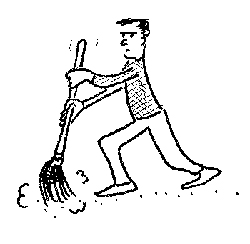 When we just function, just act, just work, with no idea of a “me” that is functioning or acting or working, the dharma is fully expressed, for then there is no separation. Although things are accomplished in the relative sense (cause and effect), there are no results in the absolute sense (no cause and no effect), for functioning is simply the pure expression of that which we call “it” or “thusness.” This is one of the most difficult truths to grasp, much less to carry out, and it is why work practice is such an essential part of Zen training. Work practice periods are built into the daily structure of all Zen centers and are an integral part of all meditation retreats not merely because they are practical but because they help practitioners live and function in the world with a still mind, detached from placing meanings of greater or less importance on any one thing. Zen is not limited to the meditation mat; Zen is sweeping, cooking, and cleaning as well, and work practice offers us the opportunity to practice this regularly in the zendo setting so that we can then extend such mindful practice into our daily lives.
When we just function, just act, just work, with no idea of a “me” that is functioning or acting or working, the dharma is fully expressed, for then there is no separation. Although things are accomplished in the relative sense (cause and effect), there are no results in the absolute sense (no cause and no effect), for functioning is simply the pure expression of that which we call “it” or “thusness.” This is one of the most difficult truths to grasp, much less to carry out, and it is why work practice is such an essential part of Zen training. Work practice periods are built into the daily structure of all Zen centers and are an integral part of all meditation retreats not merely because they are practical but because they help practitioners live and function in the world with a still mind, detached from placing meanings of greater or less importance on any one thing. Zen is not limited to the meditation mat; Zen is sweeping, cooking, and cleaning as well, and work practice offers us the opportunity to practice this regularly in the zendo setting so that we can then extend such mindful practice into our daily lives.
How do you view work practice? Is it a duty to be performed at the end of a sitting session? How do you view work? Is it a burden for you in one way or another, something to be endured until you can escape into the relief of the evening, the weekend, or the meditation mat? Are the daily chores around your home seeming impediments that keep you from more “interesting” pursuits? Do you undertake such chores with a heavy sigh, postpone them as much as possible, carry them out in a sloppy way? If so, the 8th-century Chan master Guishan was addressing you when he said, “Beware of spending a lifetime in vain; later regrets are useless.” Work and home chores are the Way. Pay attention! The place to begin seeing work and chores in this new light is at the zendo, to participate fully when work practice is assigned. Cleaning the bathroom or chopping the onions is no less important than sitting in deep meditation. Grasping this and acting on it is called waking up.
Thank you for subscribing to Tricycle! As a nonprofit, we depend on readers like you to keep Buddhist teachings and practices widely available.
